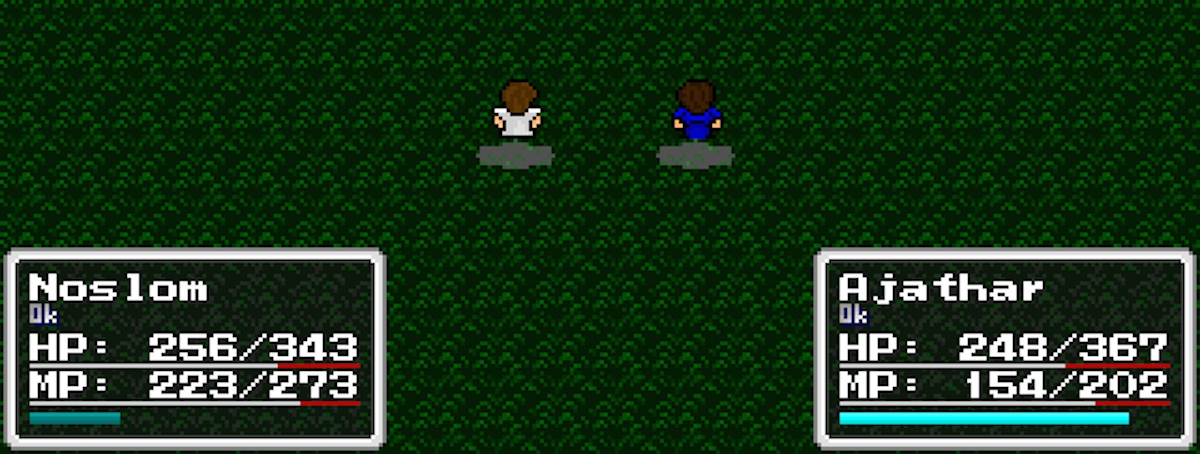New to Sly Flourish? Start Here or subscribe to the newsletter.
What Are Hit Points?
by Mike on 29 September 2014
For as long as we've had hit points as a mechanic, debates have raged about what exactly these hit points represent. Do they represent actual injury? Do they represent the overall flow of a battle's energy level between opponents? Do they represent exhaustion or magical shields of protection? For nearly forty years, as long as hit points have existed as an abstraction in combat, we've argued on various sides of this debate. Today we're going to settle it for good and all. Prepare for the answer:
Hit points are whatever you and your group want them to be.

The title of this article is a ruse. It's a trick, a scheme, or even a gambit. It's not quite like the title "You Won't Believe These Top Six Sexiest D&D Miniatures!" but it's close.
Discussing what hit points represent may very well be the most boring and useless discussion any two or more people can have when it comes to roleplaying games. Ultimately, it doesn't matter. We can decide for ourselves what hit points represent and get on with having great times with our friends.
What's the Best Version of D&D?
The edition wars between the various versions of D&D are just as easy to solve. The best version of D&D is whatever version we and our friends enjoy playing. The best RPG is the one we run at our table, the one that brings our friends closer.
The internet, it seems, has torn off our skins and left us screaming raw opinion and conjecture across the void as though it were the only voice of reason. We easily forget that we are but one of seven billion people sitting on a tiny rock in a huge universe full of countless other tiny rocks. The responsibility of solving the world's misconceptions doesn't fall on our shoulders. It isn't up to us to get everyone to think the way we do. In fact, accomplishing this would actually make the world a really boring place.
What Do We Want To Worry About?
When it comes to debating the merits of one RPG over another, what do we really gain? We can read someone else's opinion, get mad, write, respond, and continue to swirl without gaining anything at all.
Alternatively, we can try to learn. Rather than get indignant about what game someone else likes, maybe we can learn a trick or two that makes our own game a bit more fun. Since every game master is, essentially, a game designer, maybe we can hone our craft. Maybe we can spend a bit of time understanding the nature of what makes our games fun. Maybe we can pick up a few ideas from systems we didn't really consider and and slide into our game with no one being the wiser. We might even find we accept mistakes and change our minds from time to time—a true measure of strength of character.
We can't control what jackasses say or do on the web. We can only decide how much of our attention we're going to give them. Will listening to them help us run our game? Will it make our game more fun for our players? Did it teach us something about this hobby of ours that we might not have known?
Or are we simply looking for justification where we need none? Are we simply finding new reasons to get pissed off?
Knowing Our Responsibilities
We're not responsible for saving the tabletop gaming industry. We're not responsible for building the perfect RPG or ensuring that new players flood to our favorite system. We're not responsible for correcting every misconception people have about the game we love. Companies like Wizards of the Coast and Paizo need to worry about how their game reaches out and touches people. We might love to share our hobby with more people, but we don't have to continually defend it from those who would attack it because they're simply too bored to do anything else.
We GMs are responsible for running great games. Our responsibility starts and ends at the gaming table. Life becomes a lot easier when we stop worrying about whether Pathfinder is more popular than Dungeons and Dragons or not. Instead, we can spend our time and attention coming up with a new fantastic location for our players to explore or adding a new gameplay time to our games. We can spend our time and energy joining a local organized play program for Dungeons and Dragons, Pathfinder, or 13th Age.
When it comes to the discussions of our hobby, the only opinions that matter are the ones that bring us joy and make our game fun for our players.
Related Articles
- 2016 D&D 5th Edition Dungeon Master Questionnaire
- Three Reasons to Fudge Monster Hit Points
- Tweaking Monster Hit Points
Subscribe to the Newsletter
Subscribe to the weekly Sly Flourish newsletter and receive a free adventure generator PDF!








